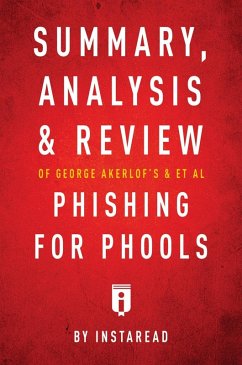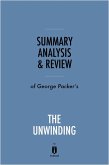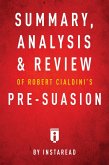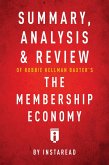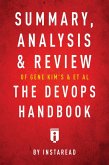Summary, Analysis and Review of George Akerlof's and et al Phishing for Phools by Instaread
Preview:
In Phishing for Phools, George Akerlof and Robert Shiller explain the economics of fraud by incorporating fraudulent and unfair transactions into free-market economic models. Conventional economic models that presuppose a free market often assume that customers make decisions based on their long-term interests. They posit that the market moves toward an equilibrium in which every legal opportunity to make money is being utilized. A behavioral model of the free market includes "phishing" transactions, which are in the seller's best interest but not the buyer's.
In a market at equilibrium in the real world, sellers have many opportunities to deceive customers. Economic models assume that customers buy things that benefit them, based on solid information and a budget, but a realistic model recognizes that customers also make choices based on more impulsive, short-term, and emotional factors. Wherever customers are vulnerable or short-sighted, a phisher is likely to step in and exploit that vulnerability...
PLEASE NOTE: This is a Summary, Analysis & Review of the book and NOT the original book.
Inside this Summary, Analysis and Review of George Akerlof's and et al Phishing for Phools by Instaread:
· Overview of the Book
· Important People
· Key Takeaways
· Analysis of Key Takeaways
About the Author
With Instaread, you can get the key takeaways and analysis of a book in 15 minutes. We read every chapter, identify the key takeaways and analyze them for your convenience.
Visit our website at instaread.co.
Preview:
In Phishing for Phools, George Akerlof and Robert Shiller explain the economics of fraud by incorporating fraudulent and unfair transactions into free-market economic models. Conventional economic models that presuppose a free market often assume that customers make decisions based on their long-term interests. They posit that the market moves toward an equilibrium in which every legal opportunity to make money is being utilized. A behavioral model of the free market includes "phishing" transactions, which are in the seller's best interest but not the buyer's.
In a market at equilibrium in the real world, sellers have many opportunities to deceive customers. Economic models assume that customers buy things that benefit them, based on solid information and a budget, but a realistic model recognizes that customers also make choices based on more impulsive, short-term, and emotional factors. Wherever customers are vulnerable or short-sighted, a phisher is likely to step in and exploit that vulnerability...
PLEASE NOTE: This is a Summary, Analysis & Review of the book and NOT the original book.
Inside this Summary, Analysis and Review of George Akerlof's and et al Phishing for Phools by Instaread:
· Overview of the Book
· Important People
· Key Takeaways
· Analysis of Key Takeaways
About the Author
With Instaread, you can get the key takeaways and analysis of a book in 15 minutes. We read every chapter, identify the key takeaways and analyze them for your convenience.
Visit our website at instaread.co.
Dieser Download kann aus rechtlichen Gründen nur mit Rechnungsadresse in A, D ausgeliefert werden.

